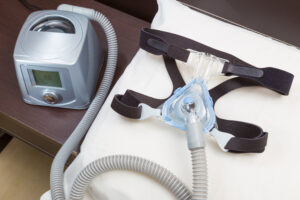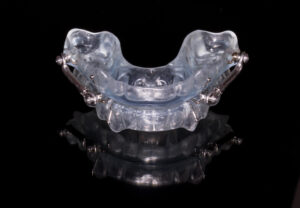Sleep apnea
It is estimated that 22 million Americans suffer from a form of sleep apnea. Therefore, it’s become a growing health concern in the United States. Sleep apnea is a common and potentially serious medical disorder. It happens when your regular breathing is interrupted during sleep, preventing a good night’s sleep.
How do I know if I have sleep apnea?
If you believe you are suffering from snoring or sleep apnea, your physician may request a sleep study. These sleeps studies can record your sleep position and stages, blood oxygen saturation, heart rate and snoring, as well as airway closure and airway narrowing. The test will determine how mild or severe your sleep apnea is based on events per hour. An event is described as the number of times your breathing is interrupted during sleep.
If you believe you are suffering from sleep apnea, be sure to consult with your physician and discuss options that will work best with you.
Alternative sleep apnea devices
Your physicians’ solutions include a sleep mask or sleep device called CPAP. In some cases, your dentist may offer less intrusive treatments if you are experiencing intolerance to the sleep mask. Sleep apnea treatment options differ for each individual based on their needs and severity.
Types of sleep apnea
There are two types of sleep apnea that may affect your everyday life.
Obstructive sleep apnea (OSA) is the most common form of sleep apnea. It is the result of blocked airflow during sleep. This occurs when the soft tissue at the back of the throat collapses while you sleep, making it difficult to breath and preventing you from getting a good night’s rest.
Central Sleep Apnea (CSA) occurs when the brain fails to send proper signals to breathing muscles in the mouth. This is more common in patients who have suffered from illnesses or diseases that affect the brain.
Symptoms of OSA
Symptoms of OSA can vary, therefore its important to look at these regions of concern. Many patients experience issues related to sleep such as snoring, gasping for air during sleep, sleepiness or lack of energy during the day. In addition, some experience recurrent awakenings or insomnia, morning headache and awakening with dry mouth or sore throat. Patients often notice daytime fatigue and irritability.
Less obvious signs could include being pre-diabetic, or having pre-hypertension (elevated blood pressure). Patients are sometimes surprised they have increased acid reflux and bruxing (grinding of the teeth) in untreated sleep disturbances.
If OSA is left untreated, can have increased health risks such as cardiac concerns like high blood pressure, A-fib, irregular heartbeat, heart attack or heart failure. Risk of stroke, diabetes and depression have also been shown to be increased.
Causes of OSA
There are many variables that suggest that you suffer from OSA. Now that we’ve seen the symptoms and health risks associated, let’s look at risk factors. There are multiple risk factors that may increase risk of apneic events such as a family history. Moreover, physical risks range from nasal congestion, swollen glands and tonsils or misalignment of the jawbone. Patients can also have modifiable risks such as:excess weight, the use of alcohol, narcotic pain medication use or smoking. Understanding risks will help to aid in screening patients, allowing them to get the right help and treatments.
Treatments of OSA
If a physician has concluded that you suffer from OSA, here are a few sleep apnea treatment options that may work well for you.
Positional therapy
Sleeping on one’s side. This has shown significant improvements in sleep apnea or snoring.
Weight loss
Excessive weight can contribute significantly to someone’s OSA.
Continuous positive airway pressure (CPAP)
This device is the standard of care for most mild to severe sleep apnea patients. The device goes over your nose or your nose and mouth and pumps air to keep your upper airway passage open. This helps eliminate snoring and apnea from occurring.
Oral appliances
An oral appliance is a great sleep apnea alternative device for those who experience extreme discomfort using the CPAP. For instance, they are easy to use and small in size, making transportation easier. This device is designed to keep your throat open or move your jaw forward. Therefore, relieving snoring and can help treat mild to moderate OSA.
Surgery
Surgery should only be considered when all non-surgical therapies have failed. Moreover, this is an invasive procedure that requires surgery of the throat, tongue or jaw.
Each case of OSA is unique and may need to be treated differently. For the best treatment results, being complaint with all recommendations presented by your physician or dentist is of importance.
At Govani Dental, we work with Kramer Family Dentistry and your physician to find the best treatment possible. Dr. Kramer is a Diplomate of The American Academy of Dental Sleep Medicine and works in conjunction with physicians to evaluate and treat sleep disordered breathing with the use of oral appliances. Your physician will work with us and our trusted specialist on the best treatment for your health.
Schedule a consultation
For those suffer from sleep apnea and have tried using the CPAP or other sleep apnea treatment options with no results, patients should consider being screened for treatment options like a custom-fit oral appliance. Oral appliance fit in your mouth, designed to have an accurate fit. In addition, they have shown success in treating patients who are compliant, with lower BMI’s and mild to moderate sleep apnea. If you have questions about your sleep apnea screening options or would like to schedule a consultation with Dr. Govani, contact us or call the office at 920-231-1955.
